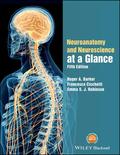Neuroanatomy and Neuroscience at a Glance
At a Glance

5. Auflage Oktober 2017
184 Seiten, Softcover
Wiley & Sons Ltd
British Medical Association Book Award Winner - Student Textbook of the Year 2018
Everything you need to know about Neuroanatomy and Neuroscience ... at a Glance!
Neuroanatomy and Neuroscience at a Glance is a highly illustrated, quick reference guide to the anatomy, biochemistry, physiology and pharmacology of the human nervous system. Each chapter features a summary of the anatomical structure and function of a specific component of the central nervous system, a section on applied neurobiology outlining how to approach a patient with neurological or psychiatric problems aligned to the chapter topic, standard diagnostic procedures for most common scenarios, as well as an overview of treatment and management options.
This fully updated and expanded new edition includes:
* Dozens of full-page, colour illustrations and neurological scans
* Expanded coverage of techniques to study the nervous system
* More practical information on the neurological exam
* New content on neuropharmacology and drug therapies
* Bullet points and bold terms throughout assist with revision and review of the topic
Neuroanatomy and Neuroscience at a Glance is the ideal companion for students embarking on a neuroanatomy or neuroscience course, and is an excellent reference tool for those in clinical training.
An updated companion website with new clinical cases, multiple choice self-assessment questions, revision slides, and downloadable illustrations and flashcards is available at www.ataglanceseries.com/neuroscience
Acknowledgements x
List of abbreviations xi
Companion website xv
Part 1 Anatomical and functional organization 1
1 Development of the nervous system 2
2 Organization of the nervous system 4
3 Autonomic nervous system 6
4 Enteric nervous system 8
5 Meninges and cerebrospinal fluid 10
6 Blood supply to the central nervous system 12
7 Cranial nerves 14
8 Anatomy of the brainstem 16
9 Organization of the spinal cord 18
10 Organization of the cerebral cortex and thalamus 20
11 Hypothalamus 22
Part 2 Cells and neurophysiology 25
12 Cells of the nervous system I: neurones 26
13 Cells of the nervous system II: neuroglial cells 28
14 Ion channels 30
15 Resting membrane and action potential 32
16 Neuromuscular junction and synapses 34
17 Nerve conduction and synaptic integration 36
18 Neurotransmitters, receptors and their pathways 38
19 Main CNS neurotransmitters and their function 40
20 Skeletal muscle structure 42
21 Skeletal muscle contraction 44
Part 3 Sensory systems 47
22 Sensory systems: an overview 48
23 Sensory transduction 50
24 Visual system I: the eye and retina 52
25 Visual system II: the visual pathways and subcortical visual areas 54
26 Visual system III: visual cortical areas 56
27 Auditory system I: the ear and cochlea 58
28 Auditory system II: auditory pathways and language 60
29 Vestibular system 62
30 Olfaction and taste 64
31 Somatosensory system 66
32 Pain systems I: nociceptors and nociceptive pathways 68
33 Pain systems II: pharmacology and management 70
34 Association cortices: the posterior parietal and prefrontal cortex 72
Part 4 Motor systems 75
35 Organization of the motor system 76
36 Muscle spindle and lower motor neurone 78
37 Spinal cord motor organization and locomotion 80
38 Cortical motor areas 82
39 Primary motor cortex 84
40 Basal ganglia: anatomy and physiology 86
41 Basal ganglia: diseases and their treatments 88
42 Cerebellum 91
Part 5 Cognition and neural plasticity 95
43 Reticular formation and sleep 96
44 Limbic system and long-term potentiation 98
45 Memory 100
46 Emotion, motivation and drug addiction 102
47 Neural plasticity and neurotrophic factors I: the peripheral nervous system 104
48 Neural plasticity and neurotrophic factors II: the central nervous system 106
49 Techniques for studying the nervous system 108
Part 6 Applied neurobiology: the principles of neurology and psychiatry 111
50 Approach to the patient with neurological problems 112
51 Examination of the nervous system 114
52 Investigation of the nervous system 116
53 Imaging of the central nervous system 118
54 Clinical disorders of the sensory systems 120
55 Clinical disorders of the motor systems 122
56 Eye movements 124
57 Neurochemical disorders I: affective disorders 126
58 Neurochemical disorders II: schizophrenia 128
59 Neurochemical disorders III: anxiety 130
60 Neurodegenerative disorders 132
61 Neurophysiological disorders: epilepsy 134
62 Neuroimmunological disorders 136
63 Neurogenetic disorders 138
64 Cerebrovascular disease 140
65 Neuroradiological anatomy 142
Part 7 History of neuroscientific discoveries 145
66 Historical neuroscience discoveries 146
Part 8 Self-assessment case studies 149
Case studies and questions 150
Answers 156
Index 161
Francesca Cicchetti PhD, Centre de Recherche du CHU de Québec (CHUQ), Université Laval, Québec, Canada.
Emma S.J. Robinson PhD, FBPhS, School of Physiology, Pharmacology & Neuroscience, University of Bristol, Bristol, UK.


